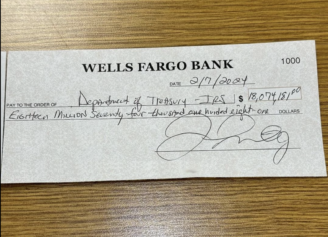On this day in 1967, Muhammad Ali stood before the world and announced that he would not fight in the Vietnam War, refusing to be drafted into Army service citing conscientious objector status.
The stance had immediate and grave financial implications on the then-champion, who was immediately stripped of his WBA, WBC, The Ring and lineal heavyweight titles. New York State suspended his boxing license and no other state would issue him one.
Eventually, he was convicted of draft evasion and sentenced to five years in prison and a $10,000 fine. He paid a bond and remained free while the verdict was being appealed, but the true impact on his family and career had just begun.
Today the media and Madison Avenue advertisers love to lionize the life of The Louisville Lip, but back then that was hardly the case. When he first announced his name change from Cassius Clay to Muhammad Ali and his conversion to Islam, it was seen as a slap in the face to the white establishment and the Kentucky businessmen who bankrolled his initial marketing ascension.
His affiliation with the Nation of Islam, Elijah Muhammad and Malcolm X proved garnered indignance and he became a polarizing of black pride and spiritually. Rocked by the assassination of President John F. Kennedy, America was now facing the realities of new President Lyndon B. Johnson escalating U.S. involvement in South Vietnam to supposedly combat communism and the Viet Cong.
As the U.S. went from 11,000 troops during Kennedys term to over 500,000 during Johnsons, Ali saw racism, classism and exclusion in America that was not being addressed as fervently as the country’s desire to quell international communism. It was the driving factor, next to his religious beliefs, that made him stay the course.
From 1967 through 1970, during the prime of his fighting life, Ali was unable to make a living as a professional boxer. He spoke around the country at colleges, defending his right of refusal to the war and pointing out the double standard of white Americans who conveniently would travel to Canada and Europe to avoid their draft induction.
Ali’s lineage of modern athletes can be traced forward to Colin Kaepernicks silent protest against societal inequities during the national anthem. The decision, along with the revelation that he did not vote in the Presidential election, cost him favor in the media and brought the ire of the patriotic marketed NFL. Today Kaepernick has yet to find a professional football team to hire him.
However, just like Kaps jersey sales went through the roof and celebrities began to rally around his cause, the war ravaged an entire generation of youth in America, shifting the narrative of Alis stance.
During the late summer of 1970, with his case still in appeal, Ali was granted a license to box by the City of Atlanta Athletic Commission.
Then in federal court the New York State Boxing Commission was forced to reinstate Ali’s license. He was vindicated and stayed the course of his beliefs. With the proliferation of police brutality, mass incarceration and victimization of people of color in America, Alis bravery is seen less and less in todays athletes.
Those bold enough to sacrifice monetary gain for this usage of their platform experience what Kaepernick is going through, exile in plain sight. On the eve of one of a huge Heavyweight matchup between Wladimir Klitschko and Anthony Joshua at Londons Wembley Arena, lets remember that some champions were bold enough to walk away from the money.
Ali continued to grow his athletic legacy, which stemmed from his winning the Gold Medal in the 1960 Rome Olympics. Klitschko and Joshua both won Olympic gold for respective countries, and Joshua has a nascent track record of advocating for disadvantaged youth and homelessness in his native England.
On this day, homage must be paid to Alis stance, which paved the way for the young fighter and millions of athletes of any color to muster the courage to stand up for what they believe in.



